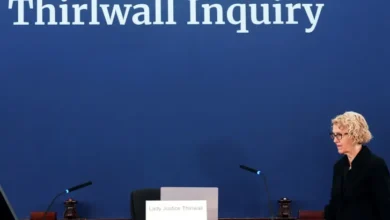What far-right AfD’s district election win means for Germany

At the Alternative for Germany’s (AfD‘s) post-election party in the eastern town of Sonneberg, Björn Höcke, one of Germany’s most recognisable right-wing politicians, could hardly contain his joy.
The party had just won its first district election in Germany, granting the AfD its first taste of executive power.Höcke, its leader in the state of Thuringia, predicted far more significant victories ahead, telling attendees on Sunday to prepare to create “a political earthquake” at state elections next year.
Sonneberg is one of Germany’s smallest districts with about 57,000 residents, but the results of Sunday’s run-off have sowed deep concern that measures to contain far-right populism in Germany are failing.
The AfD’s Robert Sesselmann, a local lawyer, defeated the Christian Democratic Union’s (CDU’s) candidate, Jürgen Köpper, by winning 53 percent of the vote to Köpper’s 47 percent despite all other parties supporting his opponent. The turnout was 60 percent.Sesselmann’s campaign focused on national rather than local politics.
He called for an end to sanctions on Moscow and negotiations to end Russia’s war in Ukraine.
Sesselmann also railed against inflation, increased irregular migration and green energy policies like the government’s plan to phase out gas boilers from homes in favour of heat pumps.
Such policies lie far beyond the powers of a rural administrator but tap into issues that have generated a groundswell of support for the AfD.
Opinion polls show a doubling of its support in the past year as it has tried to position itself as the only true opponent of the political status quo.In recent weeks, it fell slightly short of winning the mayoralty in the city of Schwerin, capital of the northeastern state of Mecklenburg-Vorpommern, and the district of Oder-Spree on the Polish border.
In the eastern states of Saxony, Thuringia and Brandenburg, which all see elections in 2024, the AfD holds a clear and consistent lead.
The birth of the AfD
The AfD was founded in 2013 to oppose the eurozone and German support for bailouts of indebted euro-using countries. It rode a xenophobic backlash against former Chancellor Angela Merkel’s open-door policy when waves of asylum seekers entered the European Union in 2015, and the party won enough votes in 2017 elections to enter the federal parliament.Although its base lies in the states of the former East Germany, the AfD’s appeal is increasingly a national phenomenon.
A Kantar poll on Saturday put the AfD’s support at 20 percent, behind only the Christian Democrats at 27 percent.
The governing coalition of the Social Democrats (19 percent), Greens (15 percent) and Free Democrats (7 percent) would fall well short of a majority in the face of another election.
Axel Salheiser, director of research at the Institute for Democracy and Civil Society in Jena, told Al Jazeera that the result in the Sonneberg run-off has “a highly symbolic political effect”.
“All the more so as it means the AfD gets the desired attention throughout Germany and propagandistically inflates the election in small Sonneberg as the ‘starting shot’ of a march on municipal offices and institutions throughout Thuringia and Germany,” he said.
‘Dam breach’
The result in Sonneberg has led to an outpouring of despair and recrimination from other parties and civil society groups.
“This is a dam breach that the democratic political forces in this country simply cannot accept,” said Josef Schuster, president of the Central Council of Jews in Germany.
Many figures in the AfD have been accused of anti-Semitism, including Höcke, who once described Berlin’s Holocaust memorial as a “monument of shame”.
Greens co-leader Ricarda Lang described the AfD as a “threat to democracy” and advocated for increased investment in rural areas so they are not economically excluded.










